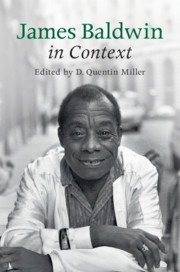Book contents
- James Baldwin in Context
- James Baldwin in Context
- Copyright page
- Contents
- Contributors
- Introduction: James Baldwin in Context
- Part 1 Life and Afterlife
- Part 2 Social and Cultural Contexts
- Part 3 Literary Contexts
- Chapter 19 The Protest Essay Tradition
- Chapter 20 Baldwin and the Black Arts Movement
- Chapter 21 Baldwin and the Rhetoric of Confession
- Chapter 22 The Poetics of Beautiful Blackness On Baldwin and Négritude
- Chapter 23 Mid-Century Theater
- Chapter 24 Sex and the Twentieth-Century Novel
- Chapter 25 Responding to Richard Wright
- Chapter 26 Baldwin’s Literary Friendships
- Chapter 27 Reviewers, Critics, and Cranks
- Chapter 28 Baldwin’s Collaborative Dance
- Chapter 29 Baldwin’s Literary Progeny
- Index
Chapter 25 - Responding to Richard Wright
from Part 3 - Literary Contexts
Published online by Cambridge University Press: 12 July 2019
- James Baldwin in Context
- James Baldwin in Context
- Copyright page
- Contents
- Contributors
- Introduction: James Baldwin in Context
- Part 1 Life and Afterlife
- Part 2 Social and Cultural Contexts
- Part 3 Literary Contexts
- Chapter 19 The Protest Essay Tradition
- Chapter 20 Baldwin and the Black Arts Movement
- Chapter 21 Baldwin and the Rhetoric of Confession
- Chapter 22 The Poetics of Beautiful Blackness On Baldwin and Négritude
- Chapter 23 Mid-Century Theater
- Chapter 24 Sex and the Twentieth-Century Novel
- Chapter 25 Responding to Richard Wright
- Chapter 26 Baldwin’s Literary Friendships
- Chapter 27 Reviewers, Critics, and Cranks
- Chapter 28 Baldwin’s Collaborative Dance
- Chapter 29 Baldwin’s Literary Progeny
- Index
Summary
Regarded as the most prominent African American writer in America from 1940 until the ascendancy of Ellison and Baldwin in the 1950s, Richard Wright was influential in launching James Baldwin’s career. The publication of Wright’s groundbreaking protest novel Native Son (1940) assured his reputation. It seemed only natural that aspiring young writers such as Baldwin would appeal to him for advice. Wright’s influence on Baldwin came in the form of encouragement and mentoring, rather than solely through his direct impact on Baldwin’s stylistic techniques or fundamental themes. Wright took an active interest in Baldwin and facilitated his attempts to become a writer. As Baldwin recounts in his essay “Alas, Poor Richard” first published in Le Preuve in 1961, Wright agreed to read drafts of his unpublished first novel. According to Baldwin, Wright “commented very kindly and favorably on them [the drafts], and his support helped me to win the Eugene F. Saxton Fellowship. He was very proud of me then, and I puffed up with pleasure that he was proud, and was determined to make him prouder still.”
- Type
- Chapter
- Information
- James Baldwin in Context , pp. 264 - 275Publisher: Cambridge University PressPrint publication year: 2019



